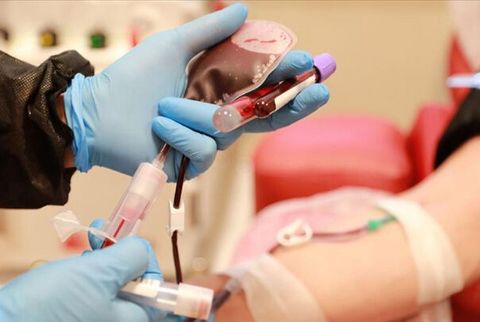Plasma therapy hope for Covid-19 patients

BAHRAIN is looking at plasma therapy to treat Coronavirus Disease (Covid-19) patients, it has emerged.
The process involves taking antibody-rich plasma from recovered coronavirus patients and injecting it into people who have severe cases of the disease.
The country’s first Covid-19 patient who has recovered donated 600ml of blood at the Salmaniya Medical Complex (SMC) Blood Bank yesterday.
Jaffar Mahdi, who works as a school bus driver, was tested positive for the virus on February 24 and was the first in the country to recover, on March 4.
The 27-year-old from Ma’ameer (Case No 1) was reportedly among two Bahranis who recovered from Covid-19 and donated blood.
No details were available of the second donor.
“I am happy to give blood and happy that I can help others to get cured from Covid-19,” Mr Mahdi told the GDN.
“There were two of us at SMC to donate blood to help in plasma treatment.
“It took me half an hour to give 600ml of blood; I hope more recovered people come forward to do this.”
Protocol
Mr Mahdi arrived in Bahrain from Iran, via Dubai, before the Islamic Republic announced the Covid-19 outbreak in its cities.
Bahrain’s plasma therapy protocol follows similar initiatives announced by the UAE and Kuwait in the past few days.
The UAE started clinical trials on Saturday, while the Kuwait Central Blood Bank started making plasma artificially to treat coronavirus patients last week.
The treatment, known as the convalescent plasma therapy, involves extracting the liquid component of blood from someone who has survived the infection and to inject it into people tested Covid-19 positive.
The method has been used to treat the sick in past epidemics, and it is generally considered low risk; researchers are now studying if it works against the new strain of coronavirus.
US Food and Drug Administration is yet to approve the treatment but is allowing initial clinical trials.
On Saturday doctors in Texas, the US used plasma from recovered Covid-19 patients to treat others, while Turkey also announced on Friday that a patient undergoing the treatment showed partial signs of recovery.
Last month, the Journal of the American Medical Association published an article about the improvement in health conditions of five critically ill Covid-19 patients in Shenzen, China after receiving convalescent plasma transfusions.
Another study said that within one to three days of a plasma transfusion, 10 Covid-19 patients in Wuhan, China showed no symptoms or improved significantly.
Experts said donors must have a lab-confirmed positive test for Covid-19 or test positive for its antibodies after recovery and be symptom-free for at least 28 days before donating blood.
Someone who initially tests positive but then tests negative can also donate after being symptom-free for 14 days.
However, plasma donors and recipients must be of the same blood type.
According to studies, the technique was used to treat haemorrhagic fever in 1979 and Spanish influenza in 1918, but research did not find it to be effective when used to treat Ebola in 2014 in Guinea, Sierra Leone and Liberia.
Many countries including Bahrain are currently using hydroxychloroquine to treat the virus, a drug typically used to treat malaria and lupus, which has shown, in limited research, potential to speed recovery.
But studies also cite that it comes with risks; when administered in high doses, it can cause heart arrhythmia and cardiac arrest.
Source: https://www.youtube.com/


